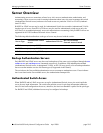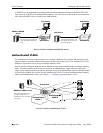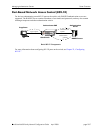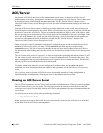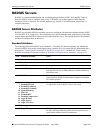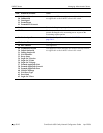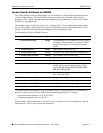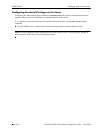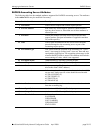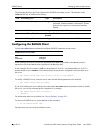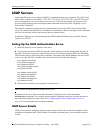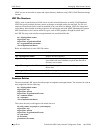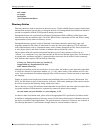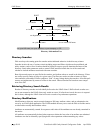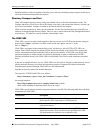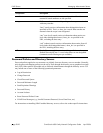
Managing Authentication Servers RADIUS Servers
OmniSwitch 6600 Family Network Configuration Guide April 2006 page 20-13
RADIUS Accounting Server Attributes
The following table lists the standard attributes supported for RADIUS accounting servers. The attributes
in the radius.ini file may be modified if necessary.
Num. Standard Attribute Description
1 User-Name Used in access-request and account-request packets.
4 NAS-IP-Address Sent with every access-request. Specifies which switches a
user may have access to. More than one of these attributes is
allowed per user.
5 NAS-Port Virtual port number sent with access-request and account-
request packets. Slot/port information is supplied in attribute
26 (vendor-specific).
25 Class Used to pass information from the server to the client and
passed unchanged to the accounting server as part of the
accounting-request packet.
40 Acct-Status-Type Four values should be included in the dictionary file: 1 (acct-
start), 2 (acct-stop), 6 (failure), and 7 (acct-on). Start and stop
correspond to login/logout. The accounting-on message is sent
when the RADIUS client is started. This attribute also includes
an accounting-off value, which is not supported.
42 Acct-Input-Octets (Authenticated VLANs only) Tracked per port.
43 Acct-Output-Octets (Authenticated VLANs only) Tracked per port.
44 Acct-Session Unique accounting ID. (For authenticated VLAN users, Alca-
tel uses the client’s MAC address.)
45 Acct-Authentic Indicates how the client is authenticated; standard values (1–3)
are not used. Vendor specific values should be used instead:
AUTH-AVCLIENT (4)
AUTH-TELNET (5)
AUTH-HTTP (6)
AUTH-NONE (0)
46 Acct-Session The start and stop time for a user’s session can be determined
from the accounting log.
47 Acct-Input-Packets (Authenticated VLANs only) Tracked per port.
48 Acct-Output-Packets (Authenticated VLANs only) Tracked per port.
49 Acct-Terminal-Cause Indicates how the session was terminated:
NAS-ERROR
USER-ERROR
LOST CARRIER
USER-REQUEST
STATUS-FAIL



